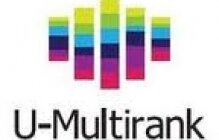Views of incluD-ed on the new international university ranking, U-Multirank
Vie, 10/05/2013
U-Multirank, a new university ranking system set up with European funding, has been publicly launched under the Irish EU Presidency in Dublin on 30 January. incluD-ed fully supports the good intentions and the engagement in this field shown by the European Commission. However, incluD-ed is concerned about several other aspects of U-Multirank and has sent a position paper to Androulla Vassiliou, the European Commissioner for Education, Culture, Multilingualism and Youth, and to the CHERPA network, which is responsible for the design and implementation of the ranking.
U-Multirank will rate universities according to a broad range of factors, in five separate areas: reputation for research, quality of teaching and learning, international orientation, success in knowledge transfer (such as partnerships with business and start-ups), and contribution to regional growth. Some 500 universities from Europe and across the world are expected to sign up to take part in the ranking and the first results will be published in early 2014.
The Commission is aware that a good university ranking needs to cover the full diversity of university types and their missions and to use indicators that are of interest to students and other stakeholders to allow users to make a ‘personalized ranking’, based on the dimensions and underlying indicators they prioritize. incluD-ed fully supports the good intentions and the engagement in this field shown by the European Commission, since the mission of this European network is to actively contribute to the elimination of barriers to inclusive education and to promote equal opportunities in the educational context including the access to higher education.
However, incluD-ed expresses its concern regarding several other aspects of U-Multirank sending a position paper to the European Commissioner for Education, Culture, Multilingualism and Youth Androulla Vassiliou and the CHERPA network, led by the Centre for Higher Education Policy Studies at Twente University, the Netherlands, and the Zentrum fur Hochschulentwicklung (CHE), Germany, responsible for the design and implementation of the ranking.
Therein, incluD-ed drew the attention to certain aspects important for people with special needs and underlined to take into account the following points:
> A user-driven ranking needs to consider factors that are important to people with disabilities such as accessibility of buildings, provision of vital learning supports, available grants and adequately trained teachers, as well as the existence of support services for students with disabilities.
> incluD-ed asked for greater involvement and more transparency of disability organisations and stakeholders in the development process of the ranking indicators and in the design of the web tool. incluD-ed believes that in the testing phase of U-Multirank, stakeholders representing people with disabilities should be included to integrate their special information needs and ideas.
> User-friendliness must include accessibility. The whole U-Multirank website should be made accessible, according to the W3C – WAI A standards for accessibility.
> Data-collection in collaboration with European Agency for Special Needs and other organisations for people with disabilities should be envisaged in order to independently collect and provide data on the accessibility of European universities.
> European Universities have to set milestones in terms of accessibility therefore incluD-ed believes that it is crucial to include the accessibility of European and international universities as one criteria in U-Multirank.
Read the complete position paper
Commissioner Androulla Vassiliou said in 2013 that the ranking also aims to “contribute to the modernization and quality of higher education by enabling universities to identify their strengths or weaknesses and learn from each other's experience”.
incluD-ed sincerely hopes that accessibility will be integrated as an indicator in the ranking and that universities will do necessary improvements in this field in order to allow more people with disabilities to pursue their studies at higher education institutes and to enjoy fully their rights.
__________
U-Multirank is co-financed by the EU and will receive a total amount of 2 million euros until 2014. In Dublin, the Irish Presidency underlined their commitment to helping support the roll-out of the next phase of U-Multirank.
Website of U-Multirank: http://www.umultirank.org/


















